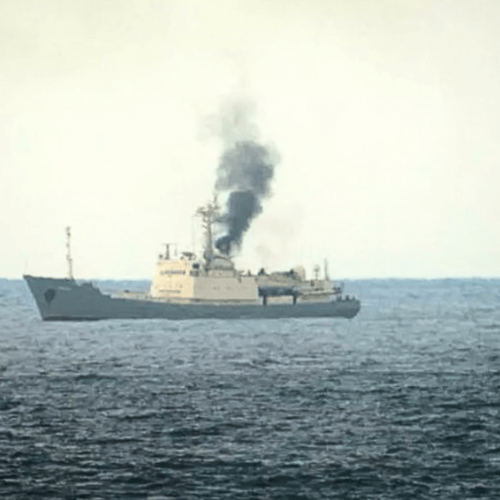A recent fire onboard a Russian spy ship off the coast of Syria has raised serious concerns about the state of Russia’s navy in the Mediterranean Sea. According to experts, the fire highlights the poor condition of Russia’s naval fleet, which is struggling with outdated equipment, lack of proper maintenance, and ongoing issues with readiness.
The incident occurred last Thursday when the Russian ship Kildin, which is more than 50 years old, caught fire while sailing off the Syrian coast. Thick black smoke was seen coming from the ship’s funnel, and the crew signaled for help by hoisting two black balls up the mast, a sign that they had lost control of the vessel.
Despite the ship being in distress, the crew did not request assistance. Instead, they managed the situation themselves, and after five hours of fighting the flames, the crew managed to restart the ship’s engines and continue their journey. Meanwhile, a nearby cargo ship, the Milla Moon, was warned to stay at least two kilometers away from the Kildin due to its inability to steer.
Russian Fleet Struggling with Age and Poor Maintenance
The Kildin fire isn’t an isolated event. Experts believe it is just one example of the many issues facing Russia’s navy in the Mediterranean. Two months before this incident, another fire broke out on the Russian missile frigate Admiral Gorshkov. Other Russian ships, including the landing ships Ivan Gren and Aleksandr Otrakovsky, were reported to be temporarily out of control at the same time as the Kildin incident.
Russian Spy Ship Near U.K. Infrastructure: Britain’s Stark Message to Putin
These problems show a larger issue with the Russian navy. Russia’s fleet is aging, and it has struggled for years to maintain its ships properly. Fires and other accidents are not unusual on Russian naval vessels, and many experts believe that the lack of resources for maintenance and the wear and tear from continuous operations are taking a toll on the ships. Russia’s navy simply doesn’t have enough support to keep its fleet in top shape, especially in areas far from home like the Mediterranean.
The Loss of Strategic Port in Syria
This fire also comes at a time when Russia’s naval position in the Mediterranean is under threat. For many years, Russia has used the port of Tartus in Syria as a key base to support its activities in the region. But this important location may be in danger after changes in Syria’s leadership.
The new government in Syria, which has taken power after the fall of Bashar al-Assad’s ally, may not be as friendly to Russia’s military presence. Just last week, the new leadership canceled a contract that gave Russia control over a commercial port at Tartus, which was part of Moscow’s plan to use the port for exporting agricultural products. Without access to this port, Russia could lose one of its most vital locations in the Mediterranean.
The situation in Syria is further complicated by the fact that the new leadership in the country is unsure about its future relationship with Russia. Without Tartus, Russia could face even more trouble with its already struggling fleet, making the problems with its ships even worse.
WIP Sanctions Strike: Bold U.S. Move Targets Russia’s Shadow Oil Tankers Before Launch
The Risk of an Unstable Fleet
If Russia loses control of the Tartus base, it could turn an already difficult situation into a full-blown crisis for the navy. Russia’s fleet, which consists mainly of smaller vessels packed with missiles, was designed for defending its own shores, not for long-distance travel and extended operations. The smaller the ship, the more maintenance it needs, and this becomes an even bigger problem when there are limited resources to repair and maintain them.
Russia’s navy was built to defend its coastal waters, but operating in distant regions like the Mediterranean has revealed the weaknesses in the fleet. The ships are simply not equipped to handle the long voyages or constant operations far from their home ports, making maintenance a constant challenge.
As Russia looks for alternative locations in the Mediterranean, the options are not ideal. Countries like Algeria, Sudan, and Libya all present potential problems for Russia’s naval ambitions in the region. In Libya, for example, Russia is working with a general named Khalifa Haftar, but relying on him for a naval base would make Russia’s Mediterranean fleet vulnerable to the unstable political situation in the country.
All in all, the fire on the Kildin is just one sign of deeper issues facing Russia’s naval presence in the Mediterranean. From aging ships to the loss of key ports, Russia’s fleet is struggling to maintain its grip on the region, and it may face even greater challenges in the near future.


